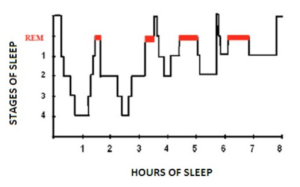7 Proven tips: how to remember your dreams
Some people naturally remember their dreams, but if you’re reading this article, that’s probably not the case for you. Before we cover how to remember dreams, why do you want to remember them in the first place? Do you want to get more familiar with your subconscious mind? Do you want to learn lucid dreaming? A little bit of both?
Learning new things like this can be daunting and you’ll need a reason to keep trying if things get difficult. So, before you practice the below tips and tricks, I highly recommend you take a moment to clarify why you want to remember your dreams.
I want you to prevent self-discouragement when it comes to dreamwork; don’t let little failures stop you from making progress. These practices don’t always work on the first day, but you’ll be surprised at how responsive your mind is when you put in the effort over time.
Ok, so enough about why the “why” is so important, let’s get to the HOW: below are my tips for how to improve dream recall and remember dreams more often!
1. Intend on remembering your dreams
This might seem obvious, but if you want to improve dream recall, the first step is simply setting your intention to do so – and mean it.
Feelings > words.
Feel it in your bones. Tell yourself with conviction before you fall asleep, “I will remember my dreams when I wake up.” You could even repeat this over and over, mantra-style, to reinforce the intentionality. This engages your prospective memory (remembering to remember something in the future) and will get those subconscious juices flowing. As you set your intentions for remembering dreams, consider what motivates you in the first place.
Motivation leads to intentions, intentions lead to actions, actions lead to results.
2. Get a dream journal and write in it
 After you’ve identified your reason why you want to remember dreams and set your intention to do so, the next step is planning on writing them down.
After you’ve identified your reason why you want to remember dreams and set your intention to do so, the next step is planning on writing them down.
Actions > feelings.
Embody your intentions; make it real by buying a dream journal and placing it next to your bed. Adopt a writer’s mentality and commit to forming this new habit.
Why write in a dream journal?
- Nearly all of your dreams will be forgotten forever if you don’t create a record of them. But you can immortalize your dreams simply by writing them down. Your dream journal will become the only record of your dreams in existence. And the bonus is, if you re-read dreams you wrote down years ago, you’ll be astonished at how clearly the memories return to mind.
- Your dream journal can be a vehicle for self-discovery, self-awareness, self-exploration, and self-integration. As you build your collection of written dreams, take some time to read through them, and look for common themes or patterns. These are the patterns of your subconscious mind. They are trends in your personality that would otherwise remain below the conscious threshold and kept in the dark.
- If you’re hoping to learn lucid dreaming, consider what it’d be like to have lucid dreams while you’re sleeping, but being unable to remember them when you wake up. What would be the point? Make it easy on yourself and write it down! As my 5th grade English teacher used to say: “Paper remembers, people forget”.
Click here to learn why dream journaling is essential for improving your memory of lucid dreams.
Three quick dream journal techniques
-
- When you first wake up, do not move. The instant you start moving, you start taking in information from the outside world, and the experiences from the inner world begin to fade back into subconsciousness. So, lay completely still and rehearse the dream in your mind before you open your eyes or move your body at all. We’ll cover this in detail down below in tip 6.
- A daytime supporting exercise for the above is reminding yourself a few times a day to rehearse what you were just thinking for the last minute or so as if it were a dream you just woke up from. This will condition your mind for remembering mental content from a moment ago.
- When you write in your dream journal, write in first person present tense. This will help you feel like you’re back in the dream when you re-read it and reinforce the memory even further. Compare these two journal entry excerpts for example:
INCORRECT: (1st person past tense) – “I was in a city and the streets were paved with grass. I saw someone I recognized and thought I should go say hi but for some reason, I just walked right past him.”
CORRECT: (1st person present tense) – “I am in a city and the streets are paved with grass. I see someone I recognize and think I should go say hi but for some reason, I just walk right past him.”
Writing in a dream journal can also help you develop metacognition (awareness of awareness), or familiarity with your mind. This is all related to mindfulness practice, but that’s a topic for another time.
3. Plan to have meaningful dreams
Human memory is selective.
“If we remembered everything, we would be as ill as if we did not remember anything.”
– William James
Our memories select for the important things that happen to us in waking life. We cannot remember every single detail from every single event in our lives, can we? And when does the brain consolidate the memories from our experiences of the day? During sleep! And especially during Rapid Eye Movement Sleep (REM Sleep).
In other words, memories from the day are formed during dreams. And you can consciously plan on having more meaningful dreams while you sleep. Thus influencing your memory in a few cool ways.
Meaningful dreams are memorable dreams
You can influence your dream content and plan on having more memorable dreams with the right intentionality. Specifically, focus on the kind of dream content you want to have. Dream content includes:
- The mood, and overall emotional tone of the dream
- Relevance to your waking life (versus having no apparent relevance)
- Characters, people, animals, made-up creatures.
- Generally, all the situations and experiences that occur in the dream – the places, events, etc.
Just as you can plan on thinking about something or doing something later in the day, you can plan on dreaming about something during sleep. It’s still you when you’re dreaming; it may seem foreign, but it’s still your mind in there.
And the mind is naturally plastic and flexible. See how responsive your mind is by telling yourself: “Ok, tonight, have more meaningful dreams!” and seeing what happens. This technique doesn’t always work, but it’s absolutely possible and worth striving for.
Don’t believe me? Check out Imagery Rehearsal Therapy… clinical therapists have patients envision and rehearse the kind of dreams they want to have (rather than the disturbing nightmares they have) and with the right guidance and persistence, it works!
4. Contextualize your dreams
 Dreams are much easier to forget if they seem random and meaningless. So another great way to give more meaning to your dreams, and thus make them more memorable, is to put them in context with each other.
Dreams are much easier to forget if they seem random and meaningless. So another great way to give more meaning to your dreams, and thus make them more memorable, is to put them in context with each other.
How? — Put the pieces together.
Once you have (X number…maybe 5-10) dream journal entries, read through them, and write down the patterns. Find recurring trends like similar places, people or situations that keep popping up in your dreams. These dream trends can reveal subconscious concerns or desires you otherwise weren’t consciously aware of. And not only will this help you improve dream recall, but it can show you what you should work on to make your life better! All according to your own subconscious ally.
When I tried this technique, it became super easy to remember my dreams and I also learned a lot about myself. The trends from those dreams made it clear to me that I needed to make a specific set of changes. I made them, and since then, I don’t dream about those things anymore, AND I feel like I’m in a much better place in life because of it.
5. Hack your sleep schedule
Of course, make sure to practice good sleep hygiene before you do this… but for quick and easy dream recall, you just need to wake up at the end of a REM period. Dreams are the most vivid and elaborate during REM sleep, and if you wake up immediately after the dream happened, it’ll be much easier to remember.
There are a few ways to wake yourself up immediately after a REM period. 
- One is to drink 3 large glasses of water before bed. This is Harvard Medical School professor of Psychiatry Dr. Robert Stickgold’s classic recommendation.
- Another is to simply sleep in… your REM periods in the morning are much longer and more consolidated. So if you sleep for 9 hours or so, the dream periods will be longer with more content to remember.
- We have one REM period about every 90 minutes as we sleep, and we usually sleep through the first 3 or 4 REM periods without waking up, and thus without remembering those dreams. So you could set alarms to wake you up right after your 4th (6 hours after sleep onset) or 5th (7.5 hours after sleep onset) REM period and that should make it much easier to remember your dreams when you wake up.
6. Use the hypnopompic state to your advantage
When you first wake up, there’s a short window of opportunity to extract dream content. So you want to cooperate with your mind and pull that content from one state of consciousness into the other.
I love Andrew Holecek’s metaphor for this: ‘interstate traveling’. If you’re traveling from the dream state to the waking state, the river you have to cross is the hypnopompic state. The hypnopompic is the transitional phase between sleep and wake. And if you hang out in this grey area for a moment, and replay the dream in your mind, you can bring subconscious content with you into the realm of waking consciousness.

This may take a little practice, but here’s how to do it:
- When you first wake up, do not move your body – at all. The more you move around, the faster you’ll forget the dream. So, lay completely still, keep your eyes closed, go over the dream you just had with intentions of writing it down.
- Replay it as clearly and genuinely as you can. Resist the temptation to modify or filter or censor any of your dream content – especially if it’s taboo, disturbing, or nonsensical. Just replay it as it happened, and plan to write an honest account of the dream to the best of your recollection. It’s your mind, don’t pretend it’s something else – that’s cheating.
- When you’re ready to start writing, open your eyes, move your body, and cross over into the waking state. Just make sure your dream journal is within arm’s reach so you can start writing immediately.
7. Galantamine for remembering dreams
Galantamine is proven to be an effective supplement for inducing lucid dreams. It is sold over the counter as a memory enhancement supplement. This drug is also used to treat Alzheimer’s Disease which can lead to Dementia. It acts by increasing levels of the neurotransmitter acetylcholine, which promotes memory formation in the brain.
Learn more about galantamine here, and consider trying this supplement to improve dream recall.
Key takeaways for improving dream recall
First, adopt the right mindset and plan on working with aspects of your mind you usually don’t work with. Set clear intentions and mean it. This is a practice of bridging the gap and developing a stronger relationship with your mind. So you have to put a little time and effort into this. But the good news is these mental exercises are just like physical exercises; the time and effort you put in will make you a better version of you.
Second, plan accordingly with the above tips and tricks. Get the dream journal, make it easy on yourself to write in it every day, and most importantly, write!
Third, dreams are more memorable when they’re more meaningful and you can choose to make them more meaningful.
Fourth, hack your sleep schedule and work with the hypnopompic state. Set intentions clearly to do these things and plan accordingly. Your mind will respond accordingly.
And last but not least, make this practice light and fun! You dream every night anyway, might as well use that time to your advantage, and enjoy this wonderful part of your mind. Relating with your dreams is a great way to cultivate self-integration and self-integration is a must for well-being.
Comment below with questions, concerns, or just stories about your dreams!

1 thought on “7 Tips for How to Remember Dreams”
I have been lucid dreaming and studying it for decades so I am quite familiar with a lot of the material, but you actually surprised me with a couple of aspects to dream journaling that appear new to me. Excited for that. Firstly, that one line feelings > words and the second one actions > feelings. That is a simple yet powerful lesson. The only issue is getting to the place of feelings on an emotional level to have a real impact. And some of the tips on recall. That tip for rehearsing during the day..brilliantly simple! That’s the best part. This stuff has to feel doable. Your guidance is encouraging in all the right ways.